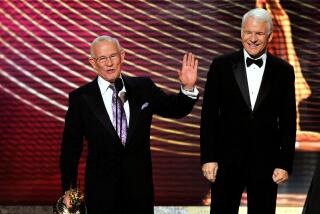Fibber, Funny Friends No Longer Fit In
- Share via
Fibber McGee died awhile back. He was old--91--and had been ailing for several years, and I hadn’t seen him for a long time, but I had a great feeling of sadness at his death.
I used to spend a lot of time in his home. Every Tuesday night for maybe 15 years. He and his wife, Molly, were good hosts. You could depend on them to be at home, and you could depend on their neighbors to drop by--people such as Wallace Wimple and the Old Timer and Throckmorton P. Gildersleeve. There were always a lot of laughs in the McGee household, which was pretty good therapy in those days.
Fibber, of course, was a radio actor out of Peoria, Ill., named Jim Jordan, and Molly was his real-life wife, Marian. She died 27 years ago, and now Fibber--almost the last of a breed--is gone. Only a few others--notably George Burns and Bob Hope--remain of the headliners who kept Americans huddled around radio sets in the 1930s and ‘40s. It makes me feel old and sad, like losing a piece of your family and your youth at the same time.
There are stirrings to bring back these radio days--rather like the revival of big bands. Several radio stations around the country regularly play old tapes of the Burns and Allen, Jack Benny, Fibber McGee, Edgar Bergen and Fred Allen shows, among others. Live radio drama is even making a sporadic comeback; the most exotic example was the recent reading of “Babbitt” with a cast that read like a Hollywood Who’s Who. Woody Allen canonized the period last year with a delightful, gentle movie called “Radio Days.” And there is also a multitude of tapes for sale of old radio programs.
I have several in the glove compartment of my car--two of them representing radio moments engraved in my memory. The first was a wonderfully acerbic tiff between W.C. Fields and Charley McCarthy; the second, what is generally acknowledged to be the greatest radio gag ever written: the delicious moment when Jack Benny, accosted by a robber who said, “Your money or your life,” waited and waited and waited. Finally, after an excruciating 30 seconds of dead air, the robber growled, “Well?” and Benny, clearly irritated at his impatience, said, “I’m thinking it over.”
I heard that the first time it was performed, and no gag ever played so well. So I looked forward eagerly to hearing it again, but when I played the tape, it came out flat. So did Fields and McCarthy. I listened to the tapes once and then put them away, figuring the time wasn’t right and I would try them again. I haven’t because I guess I know it wouldn’t work the next time either.
I have asked myself why, and the only answer I can come up with--and I suspect it is accurate--is that these old radio shows were woven very carefully and skillfully into the fabric of the times. They fit. They complemented the rest of the fabric by giving it color and life. And now they don’t fit. They can’t be wrenched free from the times they fit so well and sewed into a new fabric for which they were not designed.
There was an enormous simplicity, naivete and lack of sophistication in the United States of the 1930s and ‘40s that could accept two white actors playing Harlem blacks called Amos ‘n’ Andy, or could go into convulsions of laughter over the contents of a hall closet that tumbled out noisily all over the floor whenever the door was impulsively opened. Every listener knew it was going to happen once in each Fibber McGee show. It always did--and we always laughed. Maybe in those Depression and wartime years, we needed some small piece of certainty like Fibber’s closet. Or maybe we just had simpler tastes.
At any rate, those qualities no longer seem to exist in American society. I don’t know if that is bad or good. It just is.
Big bands have come back because they have been able to adapt to this new society--and the society to them. I don’t think that is possible for the radio comedy of another era--another planet, really.
So sleep well, Jim Jordan. A piece of a lot of us will still be with you.
More to Read
The biggest entertainment stories
Get our big stories about Hollywood, film, television, music, arts, culture and more right in your inbox as soon as they publish.
You may occasionally receive promotional content from the Los Angeles Times.










